 |
| The theory of evolution is not an original discovery of Darwin's. He did nothing more than re-apply an old superstitious philosophy |
It is 1832...
HMS Beagle is making its way across the vast Atlantic. The ship looks like any ordinary cargo or passenger ship, but its journey is a journey of discovery, and one that will last many years. Setting out from England, it will cross the entire ocean and reach the shores of South America.
The Beagle, a ship that had been of little known importance until that time, was setting out on a 5 year voyage.
That which would ultimately make that ship famous was its passenger, Charles Robert Darwin, a 22 year-old naturalist. He had not actually studied biology but had been a student of theology at the University of Cambridge.
Though this young man's education in theology was extensive, the times in which he lived were deeply influenced by materialist thought. Indeed, one year before embarking on his journey on the Beagle, he had renounced a number of basic tenets of Christianity.
The young Darwin interpreted all the discoveries made in the course of his voyage in terms of materialist thought, and sought to explain the living things he investigated without reference to Divine Creation. He developed groundless these ideas over the ensuing years, refined them, and ultimately published his theory. His theory was proposed in 1859, in a book entitled Origin of the Species, which was not well received by the intellectual world of the nineteenth century, though which would finally provide the so-called scientific basis that atheism had been seeking to find for centuries.
Was the theory of evolution an original discovery of Darwin? Did he alone develop a theory that opened the way to one of the greatest deceits in the history of the world?
Actually, Darwin did nothing other than to retouch a superstitious idea whose foundations had been established earlier.
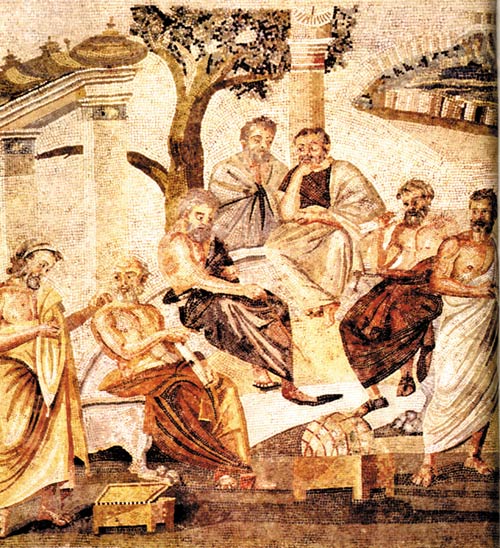 |
| The theory of materialist evolution was developed by the pagan philosophers in Ancient Greece. |
The essence of Darwin's theory of evolution is the so-called claim that, under purely natural conditions, lifeless matter spontaneously brought forth the first living things, and that from them, again under these same conditions, all other species developed merely by chance. In other words, the theory of evolution proposes the existence of a self-contained system, that has organized itself without a creator, and spontaneously brings living things into being. This false idea, that nature organizes itself without a Creator, is called "naturalism."
The theory of naturalism is as absurd as the idea that a library could create itself without writers. But, since the earliest ages of history, this idea has been defended by numerous thinkers based merely on their philosophical and ideological whims, and been adopted by a number of civilizations.
Naturalism was born and flourished in pagan societies such as Ancient Egypt and Ancient Greece. But, with the spread of Christianity, this pagan philosophy was largely abandoned, and the idea that Allah created the whole of nature and the universe came to dominate. In a similar manner, as Islam spread throughout the East, naturalist ideas, and pagan beliefs, such as Zoroastrianism and Shamanism, were eradicated, and the fact of Creation was accepted.
Nevertheless, the naturalist philosophy persisted underground. It was preserved by secret societies and emerged again under more suitable circumstances. In the Christian world, as we mentioned at the beginning of this book, naturalism was preserved by the Masons, and other secret societies who followed their lead. A Turkish magazine, named Mason, published for distribution to members of the order, provides the following interesting information:
Those who arrived at new discoveries in the world of natural phenomena and events without taking gods into account were forced to keep their discoveries to themselves. Research was done secretly and even those who were engaged in similar research had to keep their relationship hidden. This secrecy required the use of several signs and symbols in the course of projects which were undertaken.94
What is meant here by "new discoveries" is an understanding of science aligned to naturalism, a theory that does not accept the existence of Allah. This distorted approach to scientific study was developed secretly in esoteric societies that needed to use signs and symbols for this purpose, and so the roots of Masonry were established.
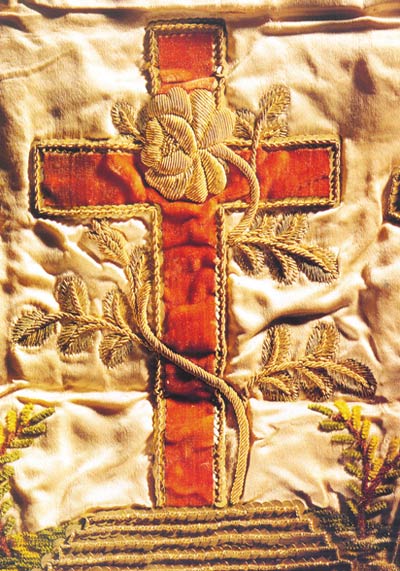 |
| The first to promote the theory of evolution in modern Europe were members of the Masonic society known as the Rosicrucians. Above: the symbol of the Rosicrucians. |
One of these so-called secret societies, responsible for planting the roots of Masonry, was the Rose-Cross (Rosicrucian) order, a sort of meeting point between the Templars and Masons. This order, first heard of in the fifteenth century, created a fury of interest in alchemy, especially in Europe, of which its members were said to possess secret knowledge. But the most important legacy of the Rose Cross order today is the naturalist philosophy, and the idea of evolution, of which it is a part. The Mason declares that the roots of Masonry go back to the Templars and the Rosicrucians, stressing the evolutionist philosophy of the latter:
Speculative Masonry or the contemporary organization of Masonry is founded on Medieval construction guilds we refer to as Operative Masonry. But, those who brought the basic speculative elements to this foundation were members of certain organizations that studied pre-historic esoteric systems and the knowledge they contained. The most important of these organizations were the Templars and the Rosicrucians…
It is unknown where and how the Rosicrucian order was established. The first traces of it come from fifteenth century Europe, but it is clear that the order is much older. As distinct from the Templars, the basic interest of the Rosicrucians was scientific. Its members were widely engaged in alchemy….The most important characteristic of its members was the fact that they believed that every stage of development was a stage in the process of evolution. For this reason, they placed naturalism at the basis of their philosophies and became known the "naturalists."95
Another Masonic organization to have developed the idea of evolution was not in the West but it was another Masonic order founded in the East. Grand Master Selami Isindag provides the following information, in an article entitled "Masonry and Us From Its Foundation Until Today":
In the Islamic world there was a counterpart of Masonry called the Ikhwan as-Safa' [The Brethren of Purity]. This society was founded in Basra in the time of the Abbasids and published an encyclopedia composed of 54 large volumes. 17 of these dealt with natural science and it contained scientific explanations that closely resembled those of Darwin. These found their way even to Spain and had an influence on Western thought.96
Though it developed in the Islamic world, this society distanced itself from basic Islamic tenets. It was influenced by Ancient Greek philosophy, which it expressed by means of an esoteric symbolism. Selami Isindag continues:
This society originated in the Ismaili sect and its basic purpose was to make religious dogmas intelligible by allegorical and symbolic explanations. Its philosophy was influenced by Pythagoras and Plato. To enter this secret society, a person was first enticed by mystical instruction and later purged of vain religious beliefs and dogmas. Later he was familiarized with philosophical and symbolic methods. Such an initiate who passed through his apprenticeship was sometimes put through training in neo-platonic ideas, and then he could begin chemistry, astrology and numerology, the science of the significance of numbers. But all this knowledge was kept secret and was given only to those deemed worthy to receive it. So, the origins of Masonry is based on these foundations. Some of the symbolic meanings of these elements were not contrary to science and logic and so survive in various places in our rituals today.97
The words quoted above, "purged of vain religious beliefs and dogmas" mean that initiates were made to reject religion at all. That is how the Mason Isindag defines religion. However, as we examined in earlier sections, "vain belief and dogma" is a euphemism particular to Masonic philosophy. It must be recognized that Masonry, or any other materialist group, express such anti-religious ideas without logical justification; they rely only on propaganda and suggestion. Because they cannot denounce religion rationally, they resort to these methods of suggestion and words selected to create a particular psychological effect.
From the quotation above, we learn that the Ikhwan as-Safa', a parallel society of Freemasonry in the Islamic world, carried on activities much like those of the modern Masons. Their method was to espouse a pagan philosophy contrary to true religion, to express that philosophy by means of symbols, and to introduce this secret philosophy to its members gradually.
 |
| The symbol shown above is used in Masonic lodges, and is a Rosicrucian symbol (the rose and the cross) combined with a Masonic symbol (the compass and square). |
In the history of Islam there have been various thinkers who in this way distanced themselves from Islam, and were influenced by the Ancient Greeks' materialist and evolutionist myths. The fact that this school of thought, that the great Islamic scholar Ghazali so loathed and refuted in his works, has a Masonic character to it surely casts some important light on the matter. In his work entitled Al-Munqidh min al-Dalal (Deliverance From Error), Ghazali directly criticized the Ikhwan as-Safa' society, explaining that it espoused a corrupt philosophy influenced by the ideas of the Ancient Greeks. And, in his work entitled Fedaih-ul-Batinniyye, he demonstrated the perversity of the teachings of the Ismaili sect, to which the Ikhwan as-Safa' belonged.
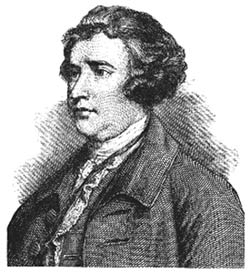 |
| In his book, Reflections on the Revolution in France, Edmund Burke showed the destructive effects of the French Revolution and the Enlightenment. |
The materialist and evolutionist ideas adopted by Masonic organizations such as the Rosicrucians or the Ikhwan as-Safa', expressed secretly, but most often symbolically, became more open as the Catholic Church's social power weakened in Europe. As a result, these pagan teachings, which had gone underground for about 1,000 years because of the political and intellectual dominance of Christianity, came into vogue again among thinkers in seventeenth- and eighteenth-century Europe.
That period in which materialist and evolutionist ideas gained widespread acceptance in European society, and influenced it in distancing itself from religion, is known as the Enlightenment. Surely, those who selected this word (that is those who characterized this change of ideas positively as a move into the light) were the leaders of this deviation. They described the earlier period as the "Dark Age" and blamed religion for it, claiming that Europe became enlightened when it was secularized and held religion at a distance. This biased and false perspective is still today one of the basic propaganda mechanisms of those who oppose religion.
It is true that Medieval Christianity was partially "dark" with superstitions and bigotry and most of these have been cleared in the post- Medieval age. In fact, the Enlightenment did not bring much positive results to the West either. The most important result of the Enlightenment, which occurred in France, was the French Revolution, that turned the country into a sea of blood.
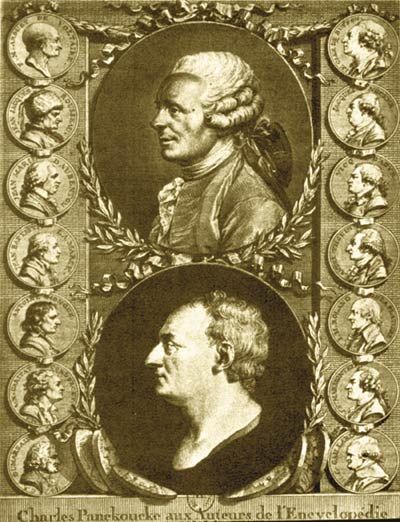 |
| Voltaire, Diderot and the "Encyclopedists": The Masonic leaders of the Enlightenment and the fierce opponents of religion. |
Today Enlightenment influenced literature praises the French Revolution; however, the Revolution cost France much and contributed to social conflicts that were to last into the twentieth century. The analysis of the French Revolution and the Enlightenment by the famous British thinker, Edmund Burke, is very telling. In his famous book, Reflections on the Revolution in France, published in 1790, he criticized both the idea of the Enlightenment and its fruit, the French Revolution; in his opinion, that movement destroyed the basic values that held society together, such as religion, morality and family structure, and paved the way towards terror and anarchy. Finally, he regarded the Enlightenment, as one interpreter put it, as a "destructive movement of the human intellect."98
The leaders of this destructive movement were Masons. Voltaire, Diderot, Montesquieu, and other anti-religious thinkers who prepared the way for the Revolution, were all Masons. The Masons were intimate with the Jacobins who were the leaders of the Revolution. This had led some historians to the opinion that it is difficult to distinguish between Jacobinism and Masonry in France of this period. (See Harun Yahya's New Masonic Order)
During the French Revolution, much hostility was evinced toward religion. Many clergymen were sent to the guillotine, churches were destroyed, and, moreover, there were those who wanted to eradicate Christianity totally and replace it with a deviant, pagan, symbolic religion called "the Religion of Reason." The leaders of the Revolution also became casualties of this madness, every one of them finally losing their heads on the guillotine, to which they themselves had condemned so many people. Even today, many Frenchmen continue to question whether or not the revolution was a good thing.
The anti-religious sentiments of the French Revolution spread throughout Europe and, as a result, the nineteenth century became one of the boldest and most aggressive periods of anti-religious propaganda.
Therefore, this process allowed the possibility for materialist and evolutionist ideas, that had been operating underground for centuries through the use of symbols, to come forth into the public. Materialists, such as Diderot and Baron d'Holbach, sought to raise the anti-religious banner, and the Ancient Greek myth of evolution was introduced into the scientific community.
 |
| Revolution: France was turned into a sea of blood. |
Those generally thought to be the founders of the theory of evolution are the French biologist Jean Lamarck and the English biologist Charles Darwin. According to the classic story, Lamarck first proposed the theory of evolution, but he made the mistake of basing it on the "inheritance of acquired traits." Later, Darwin proposed a second theory based on natural selection.
Though, here we must mention the name of another theoretician who played an important role in the origins of the theory of evolution: Erasmus Darwin, Charles Darwin's grandfather.
 |
| Erasmus Darwin, Charles Darwin's grandfather was a "Master Mason." |
Erasmus Darwin was an eighteenth century contemporary of Lamarck. A physicist, psychologist and poet, he was recognized as an authority. His biographer, Desmond King-Hele even called him the greatest Englishman of the eighteenth century.99 But, Erasmus Darwin had a very dark private life.100
Erasmus Darwin is mainly noted as one of England's most prominent naturalists. As we said at the beginning, naturalism is a view that does not accept that Allah created living things. Actually, this view, which is close to materialism, was the starting point of Erasmus Darwin's theory of evolution.
In the 1780's and 90's, Erasmus Darwin developed the main outlines of theory of evolution, according to which all living things came from a single common ancestor by chance and according to the laws of nature. He did his research in an eight acre botanic garden he had prepared, and sought evidence that would prove his idea. He explained his theory in two books, entitled Temple of Nature and Zoonomia. Moreover, in 1784 he founded a society to manage the dissemination of his ideas, known as the Philosophical Society.
Years later, Charles Darwin would inherit his grandfather's ideas and the basic outlines for the proposal of his theory of evolution. Charles Darwin's theory elaborated upon the structure established by his grandfather, while the Philosophical Society became one of the greatest and most passionate supporters of his theory.101
In short, Erasmus Darwin was the true pioneer of the theory we know of as the theory of evolution that has been propagandized throughout the world over the past 150 years.
Where did Erasmus Darwin discover the idea of evolution? Where did his interest in this subject come from?
After a thorough search for the answer to this question, we discover the interesting fact that Erasmus Darwin was a Mason. Though, Erasmus Darwin was no ordinary Mason, he was one of the highest ranking masters in the organization.
 |
| Erasmus Darwin's book Zoonomia, in which he laid the foundations for the theory of evolution. |
He was the master of the famous Canongate lodge in Edinburgh, Scotland.102 Moreover, he had close ties with the Jacobin Masons who were the organizers of the revolution in France at the time, and with the Illuminati, whose prime cause was fostering hostility to religion.103 That is, Erasmus Darwin was an important name in European Masonic anti-religious organizations.
Erasmus educated his son Robert (Charles Darwin's father), who too had been and made a member of the Masonic lodge.104 For this reason, Charles Darwin received the inheritance of Masonic teachings from both his father and his grandfather.
Erasmus Darwin hoped to have his son Robert develop and publish his theory, but it would be his grandson Charles who would undertake the enterprise. Although it came some time later, Erasmus Darwin's Temple of Nature was finally revised by Charles Darwin. Darwin's views did not have the weight of a scientific theory; it was merely the expression of a naturalist doctrine that accepts that nature has creative power.
As for the theory of natural selection that we supposed to be Darwin's one particular contribution, it too was merely a theory put forward earlier by a number of scientists. But, the scientists before Darwin's time did not apply the theory of natural selection as an argument against Creation; on the contrary, they saw it as a mechanism generated by the Creator to protect the species from a hereditary distortion. Just like Karl Marx took the idealist Hegel's concept of "dialectics," and bent it to fit his own philosophy, so did Darwin take the theory of natural selection from Creationist scientists and used it in a way so as to fit the idea of naturalism.
Therefore, Darwin's personal contribution in the formulation of Darwinism must not be overstated. The philosophical concepts he used were invented by earlier philosophers of naturalism. If Darwin had not proposed the theory of evolution, someone else would have. In fact, a theory very similar to his was proposed at the same period by another English natural scientist by the name of Alfred Russell Wallace; it was for this reason that Darwin was hasty to publish the Origin of the Species.
Finally, Darwin appeared at a stage when the long struggle had begun in Europe to supposedly destroy faith in Allah and religion, replace it with the naturalist philosophy and a humanist model for human life. The most significant force behind this struggle was not this or that thinker, but the Masonic organization, of which so many thinkers, ideologues and political leaders were members.
 |
| Alfred Russel Wallace and Charles Darwin |
This fact was recognized and expressed by several Christians of the time. Pope Leo XIII, the leader of the world's Catholics, issued a famous bull in 1884, entitled Humanum Genus in which he made many important statements about Masonry and its activities. He wrote:
At this period, however, the partisans of evil seems to be combining together, and to be struggling with united vehemence, led on or assisted by that strongly organized and widespread association called the Freemasons. No longer making any secret of their purposes, they are now boldly rising up against God Himself.
...For, from what We have above most clearly shown, that which is their ultimate purpose forces itself into view—namely, the utter overthrow of that whole religious and political order of the world which the Christian teaching has produced, and the substitution of a new state of things in accordance with their ideas, of "new state of things in accordance with their ideas which the foundations and laws shall be drawn from mere naturalism."105
The important fact that Leo XIII stated in the above quotation is of the attempt to destroy completely the moral values provided by religion. What Masonry tried to do with the help of Darwinism was to produce a morally degenerate society that recognized no Divine law, had no fear of Allah, and was susceptible to commit every kind of crime. What was meant above by "new state of things in accordance with their ideas which the foundations and laws shall be drawn from mere naturalism" is this kind of social model.
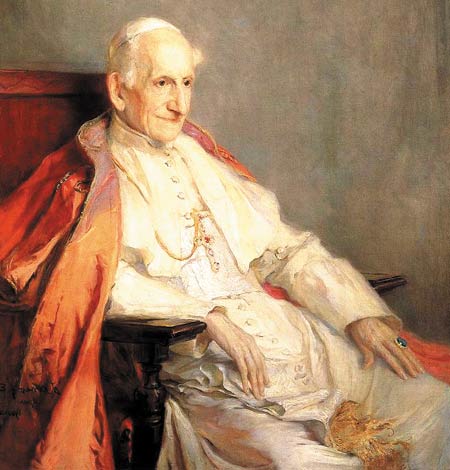 |
| Pope Leo XIII |
Masons, thinking that Darwinism could serve their goals, played a great role in its dissemination among the masses. As soon as Darwin's theory was published, a group of volunteer propagandists formed around it the most famous of whom was Thomas Huxley who was called Darwin's "bulldog." Huxley, "whose ardent advocacy of Darwinism was the single factor most responsible for its rapid acceptance"106 brought the world's attention to the theory of evolution in the Debate at the Oxford University Museum in which he entered into on June 30, 1860 with the bishop of Oxford, Samuel Wilberforce.
Huxley's great dedication to spreading the idea of evolution, together with his establishment connections, is brought into further light according to the following fact: Huxley was a member the Royal Society, of one of England's most prestigious scientific institutions and, like nearly all the other members of this institution, was a senior Mason.107 Other members of the Royal Society lent Darwin significant support, both before and after the book was published.108 This Masonic society accepted Darwin and Darwinism to such an extent that, as with the Nobel Prize, Darwin's medal was awarded annually to a scientist deemed worthy of the honor.
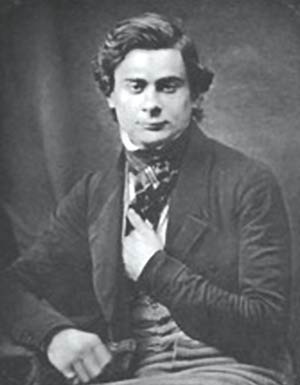 |
| Thomas Huxley, a fanatical supporter of Darwin. |
In short, Darwin wasn't acting alone; from the moment his theory was proposed, he received the support that came from the social classes and groups whose nucleus was made up of Masons. In his book, Marxism and Darwinism, the Marxist thinker Anton Pannekoek writes about this important fact and describes the support lent to Darwin by the "bourgeoisie," that is, the wealthy European capitalist class.:
That Marxism owes its importance and position only to the role it takes in the proletarian class struggle, is known to all… Yet it is not hard to see that in reality Darwinism had to undergo the same experiences as Marxism. Darwinism is not a mere abstract theory which was adopted by the scientific world after discussing and testing it in a mere objective manner. No, immediately after Darwinism made its appearance, it had its enthusiastic advocates and passionate opponents. ...Darwinism, too, played a role in the class-struggle, and it is owing to this role that it spread so rapidly and had enthusiastic advocates and venomous opponents.
Darwinism served as a tool to the bourgeoisie in their struggle against the feudal class, against the nobility, clergy-rights and feudal lords...What the bourgeoisie wanted was to get rid of the old ruling powers standing in their way... With the aid of religion the priests held the great mass in subjection and ready to oppose the demands of the bourgeoisie...
Natural science became a weapon in the opposition to belief and tradition; science and the newly discovered natural laws were put forward; it was with these weapons that the bourgeoisie fought...
Darwinism came at the desired time; Darwin' s theory that man is the descendant of a lower animal destroyed the entire foundation of Christian dogma. It is for this reason that as soon as Darwinism made its appearance, the bourgeoisie grasped it with great zeal.
...Under these circumstances, even the scientific discussions were carried on with the zeal and passion of a class struggle. The writings that appeared pro and con on Darwin have therefore the character of social polemics, despite the fact that they bear the names of scientific authors...109
Though Anton Pannekoek, because he thinks in terms of Marxist class analysis, defines the force that spread Darwinism and put into effect an organized struggle against religion as "bourgeoisie," when we examine the matter in light of more historical evidence, we see that there was an organization within the bourgeoisie that used Darwinism to pursue their war against religion. That organization was Masonry.
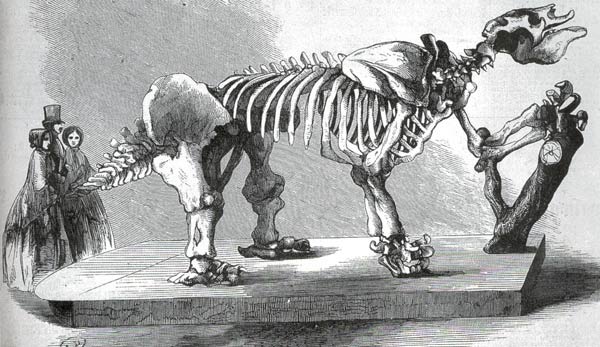 |
| Darwin's theory seemed plausible to some due to the primitive level of scientific knowledge and meager evidence in the nineteenth century. |
This fact is clear both from historical evidence as well as Masonic sources. One of these sources is an article by Master Mason Selami Isindag, entitled "Obstacles to the Development of Knowledge and Masonry," that appeared in the 1962 Annual Bulletin of the Turkish Great Lodge of Free and Accepted Masons. At the beginning of this article, Isindag repeats the classical Masonic claim that religion is a myth invented by human beings, and that monotheism is contrary to reason and science. Later, he describes the true instigator of the war against religion carried out under the guise of "science":
It will be noticed that in this struggle for the spread of knowledge, Masons are known to have participated at every level. The reason for this is that Masonry, in every period, has been guided always by logic, knowledge and maturity, that is, by wisdom. Since it was founded, it had fought against superstition and myth.110
However, in reality, "superstition and myth" is not, as the Masons claim, religion; it is, rather, the basis of the materialist, naturalist and evolutionist beliefs they espouse. The clearest proof of this fact is that it is their outmoded ideas, their repetitions of the empty beliefs of the ancient pagan civilizations of Egypt and Greece, that have been invalidated by the discoveries of modern science.
A comparison of the scientific facts relevant to the origins of life and Masonic beliefs about it will be enough to let us form a conclusion as to this fact.
As we stated at the beginning, the theory of evolution rests on the claim that living things were not created, but arose and developed due to chance and natural laws. In order to test this theory scientifically, it is necessary to look at every stage of this supposed process, and to examine whether or not such a process occurred in the past and whether such a process could have been possible.
The first step in this process is a hypothetical condition within which lifeless matter could engender a living organism.
Before looking at this condition, we must recall a law that has been recognized in biology since the time of Pasteur: "Life comes from life." That is, a living organism can be generated only from another living organism. For example, mammals are born from their mothers. In many other species of animals the young are born from eggs that had been laid by the mothers. Plants grow out of seeds. Single-cell organisms such as bacteria divide and multiply.
Nothing has ever been observed to the contrary. Throughout the history of the world no one has ever witnessed lifeless matter giving birth to a living being. Of course, there were those in Ancient Egypt, Greece and the Middle Ages who thought they had observed such an outcome; the Egyptians believed that frogs sprang from the mud of the Nile, a belief also sustained by Ancient Greek philosophers, such as Aristotle. In the Middle Ages it was believed that mice were begotten from the wheat of granaries. However, all these beliefs proved to be out of ignorance, and finally, in his famous experiments in the 1860's, Pasteur proved that even bacteria, the most basic form of life, did not come to be without a predecessor, that is, it is not possible for lifeless things to produce life.
But, the theory of evolution is dependent on this impossibility because it claims that living things were born and developed without the involvement of a Creator, and this requires that, at the first stage of this proposed scenario, living things be generated by chance.
Darwin attempted to describe the origins of life, about which he knew little, in a short sentence, wherein he stated that life must have first appeared "some warm little pond,"111 but evolutionists that followed him became concerned about elaborating on this matter. However, efforts made throughout the twentieth century to produce an evolutionist explanation of the origins of life resulted only in deepening the impasse in which evolutionists had found themselves. Apart from the fact that evolutionists have not been able to give the slightest scientific proof that life can be generated from lifeless matter, they have also not been able to provide even a theoretical explanation. This is because the structure of the most basic single-celled living organism is highly complex. It is mathematically impossible that even a cell's basic constituents—proteins, DNA or RNA—could have come to be by chance, much less the cell itself.
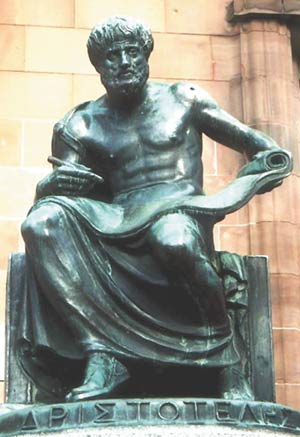 |
| Because of the rudimentary scientific understanding of his day, Aristotle proposed certain mythical explanations still accepted today in Masonic literature. |
The fact that the probability of life generating by chance is zero alone proves the existence of order, in other words the fact of Creation. On this matter, the famous English astronomer and mathematician, Fred Hoyle, makes this comment:
Indeed, such a theory (that life was assembled by an intelligence) is so obvious that one wonders why it is not widely accepted as being self-evident. The reasons are psychological rather than scientific.112
This "psychological reason" that Hoyle mentions is the evolutionists' disposition by which they insist on rejecting, in advance, every result that should lead them to accept the existence of Allah and their conditioning themselves for this.
In our other works focusing on the invalidity of the theory of evolution, we cited many admissions of this fact by the evolutionists and we examined the irrational hypotheses that evolutionists have blindly proposed merely in order to not accept the existence of Allah. At this point though, we will focus our attention on the Masonic lodges to see their view on this matter. While it is so clearly evident that "life was brought into being by an intelligent Creator," what do the Masons think about the question?
Master Mason, Selami Isindag, in his book intended for Mason audience, entitled Evrim Yolu (The Way of Evolution), explains the matter in this way:
The most important characteristic of our school of morality is that we do not depart from the principles of logic and we do not enter the unknowns of theism, secret meanings or dogmas. On this basis we assert that the first appearance of life began in crystals under conditions that we cannot know or discover today. Living things were born according to the law of evolution and slowly spread over the earth. As a result of evolution, today's human beings came to be and advanced beyond other animals both in consciousness and intelligence.113
It is important to notice the connection between cause and effect suggested in the above quotation: Isindag stresses that the most important characteristic of Masonry is that it rejects theism, that is, belief in Allah. And immediately afterwards, he claims "on this basis" that life arose spontaneously from lifeless matter, and later underwent evolution that resulted in the appearance of human beings.
It will be noticed that Isindag brings no scientific evidence to bear on the theory of evolution. (The fact that there is no scientific evidence is presupposed by the obtuse words these are facts "that we cannot know or discover today"). The only support that Isindag supplies for the theory of evolution is the Masonic non-acceptance of theism.
In other words, Masons are evolutionists because they do not accept the existence of Allah. This is the only reason for their being evolutionists.
In the constitution of the "Great Council of Turkey" organized by Turkish Masons of the 33rd degree, the evolution scenario was once again restated, and the Masons' rejection of the Creationist explanation expressed in these words:
In a very early age and according to an inorganic process, organic life came to be. In order to produce cellular organisms cells came together in groups. Later, intelligence sprang forth and human beings were born. But from where? We keep asking ourselves this question. Was it from God's breathing over formless mud? We reject the explanation of an abnormal kind of creation; a kind of creation that excludes man. Since life and its genealogy exist, we must follow the philogenetic line and feel, understand and acknowledge that a wheel exists that explains this great deed, that is the act of "leap." We must believe that there was a phase of development in which there was a great rush of activity that caused life to pass at a particular moment from that phase to another.114
THE MASONS' FALSE SUPPORT OF HAECKEL | ||
| When we look at Masonic literature, apart from their blind attachment to the theory of evolution, we are struck by its profound ignorance. For example, when we examine Turkish sources, we see that evolutionist claims that were proved false in the first quarter of the twentieth century are still defended passionately. One of these is the story of Haeckel and his theory on embryos mentioned in nearly all Masonic publications. The story is about a German biologist by the name of Ernst Haeckel, who was a close friend and supporter of Charles Darwin, and one of the most prominent supporters of the theory after Darwin's death. In order to establish the validity of the theory, Haeckel examined the embryos of various living things, and proposed that they all resembled one another and that each undergoes a miniature process of evolution before birth. To support this claim, he drew a number of comparisons between different embryos, by means of which he persuaded many of the validity of the theory of evolution in the first half of the twentieth century. As we mentioned, Masonic sources place great importance on this embryology thesis, which is termed "'ontogeny recapitulates phylogeny." Master Naki Cevad Akkerman, in an article entitled "The Concept of Truth and the Principles of Masonry" in Mimar Sinan, calls this thesis a "law," that is, he raises it to the rank of undisputable scientific fact. He writes:
Master Mason Selami Isindag also places great importance on Haeckel's theory. In an article entitled "Masonic Doctrines" he writes "In his experiments, Darwin proved that various species of animals first developed from a single cell and later from a single species." Then he adds:
In another Masonic text Haeckel is referred to as a "great scholar," and his thesis that "ontogeny recapitulates phylogeny" is claimed as proof of the theory of evolution. 3 However, the Ernst Haeckel that Masons believe to be a great scholar was an imposter who deliberately falsified scientific discoveries, and the thesis they accept as a "law" (ontogeny recapitulates phylogeny) is one of the greatest deceits in the history of science.
This deceit is found in the drawings of embryos made by Haeckel. In order to demonstrate the similarity between the embryos of human beings, chickens, rabbits, salamanders, which in reality shared no such resemblance to each other, he falsified the drawings. In some cases, he took the organs out of the embryos, in other cases he added organs. Moreover, he altered the actual size of the embryos in an attempt to show them as all the same size. In short, Haeckel conducted this falsification in order to fabricate evidence where there otherwise was none. The reputable science journal by the name of Science contained an article in its September 5 1997 edition that stated: "In reality…even closely related embryos such as those of fish vary quite a bit in their appearance and developmental pathway…It (Haeckel's drawings) looks like it's turning out to be one of the most famous fakes in biology."4 Interestingly, this deception has long been recognized for many years. Haeckel's drawings were shown to be falsifications already in his own lifetime (1910), with he himself admitted to it. In an article published in American Scientist we read: "Surely the biogenetic law is as dead as a doornail… As a topic of serious theoretical inquiry it was extinct in the twenties…"5 In spite of this, evolutionists continued to use these drawings for decades with the sole intention of deceiving the masses who had no knowledge of the topic. There is only one reason why Masons regard Haeckel's theory as a proof for the theory of evolution, and think of him as a great scholar: The Masons' dedication to the theory of evolution is not based on their passion for knowledge and truth, as they claim, but, on the contrary, out of ignorance.
1 Naki Cevad Akkerman, Mimar Sinan, No. 1, p.13 2 Selami Isindag, Masonluk Öğretileri, Masonluktan Esinlenmeler (Inspirations from Freemasonry), Istanbul, p.137 3 Selami Isindag, Din Açısından Mason Öğretisi (Masonic Doctrine According to Religion), Akasya Tekamül Mahfili Publications, p.10 4 Elizabeth Pennisi, "Haeckel's Embryos: Fraud Rediscovered," Science, September 5, 1997 5 Keith S. Thompson, "Ontogeny and Phylogeny Recaputilated", American Scientist, vol. 76, p.273 |
It is possible here to recognize Masonic fanaticism. When the writer says that they "reject a kind of creation that excludes man," he is repeating the basic dogma of humanism, that "a human being is the highest creature that exists," and announcing that Masons reject any other explanation. When he says, "an abnormal kind of creation," he means Allah's intervention in the creation of living beings, rejecting this possibility a priori. (However, what is truly abnormal is that Masons accept, without observation or experiment, the illogical belief that lifeless matter came to life by chance and formed life on earth, including human beings.) It will be noticed that according to the Masonic explanation there is no suggestion of scientific proof. Masons do not say, "There is proof for evolution and therefore we reject Creation." They are only blinded by a philosophical fanaticism.
Masonic publications insist on this tenet. Master Mason Selami Isindag claims that "apart from nature there is no force that guides us, and is responsible for our thoughts and actions." He immediately adds, "life began from one cell and reached its present stage as a result of various changes and evolutions."115 Later he summarizes what the theory of evolution means for Masons:
From the point of view of evolution, human beings are no different from animals. For the formation of man and his evolution there are no special forces other than those to which animals are subjected.116
This assertion shows clearly why Masons attach such importance to the theory of evolution. Their aim is to defend the idea that human beings were not created and to present their own humanist materialist philosophy as tenable. And, the only method that can be used to reject the idea that human beings were created is the theory of evolution. So, it is for this reason that Masons, to whatever extent, believe in the theory of evolution and seek to disseminate it throughout society.
This shows that Masons, who are constantly accusing those who believe in Allah of being dogmatic, are themselves dogmatic.
Dogmatism means to blindly and insistently support a view, for whose validity there is no proof, because of a certain psychological predisposition. A dogmatic person does not investigate or reconsider something he believes in whether or not there is any proof for it. He accepts it totally and sticks to it adamantly.
Masons and other anti-religious groups regularly use the term "dogmatic" to refer to those who believe in Allah. We encounter this accusation frequently today. For example, in a debate about the theory of evolution, the evolutionist side will probably accuse those who do not accept the theory as dogmatic, and declare themselves scientific by maintaining that science has no interest in "dogmas."
However, this accusation is false. Belief in the existence of Allah, and that He created all beings, is a fact proven by much rational and scientific evidence. There is great balance, order and organization in nature, and it is clear that this was established intelligently and with deliberate purpose.
It is for this reason that the Qur'an calls human beings to discover the signs of Allah, and invites them to consider this balance, order and organization, and in many verses commands them to think about the proofs in the heavens and on earth of the existence of Allah. Those proofs pointed out in the Qur'an are such phenomena as, not only the balance and order in the universe, but the suitability of the world to human life, the structure of plants and animals, the miraculous features of the human body, and the spiritual qualities of human beings, all of which has been substantiated by modern science. (For details, see Harun Yahya's Allah is Known Through Reason, The Creation of the Universe, Darwinism Refuted, For Men of Understanding, Design in Nature)
Rather, dogmatism is a quality of those who refuse to consider these things, and reject Allah while continuing to defend the view that the universe exists by its own accord and that living things came to be by chance. Masons are a true example of such an outlook. Despite the fact that the proofs for Allah's existence are evident, they prefer to ignore and reject them in favor of the humanist and materialist philosophy.
In the Qur'an, Allah refers to of those of such a mentality:
Do you not see that Allah has subjected to you everything in the heavens and earth and has showered His blessings upon you, both outwardly and inwardly? Yet there are people who argue about Allah without knowledge or guidance or any illuminating Book.
When they are told: "Follow what Allah has sent down," they say, "No, we will follow what we found our fathers doing." What! Even if satan is calling them to the punishment of the Blazing Fire? (Surah Luqman: 20-21)
These verses show that the godless, despite the fact that they see the proofs for Allah, "argue about Allah," that is, they engage in a war against His religion. The reason for this is that these godless people follow what they found their fathers doing, that is, they are mired in a blind traditionalism.
Evidently, traditionalism defines very well the history and philosophy of Masonry as we have been examining it from the beginning of this book.
Indeed, traditionalism is a word that describes Masonry very well because Masonry is nothing other than an "organization of traditions," whose roots go back thousands of years to earlier pagan societies. It blindly follows the traditions of Ancient Egypt, of the pharaohs and their magicians, Ancient Greek materialist philosophers, Hermeticists, Kabbalists, Templars, Rosicrucians and of Masons before them.
 |
| Masonry is the continuation of narrow-minded traditionalism. Modern Masonry maintains the same superstitious beliefs that their "brothers" have defended uncritically for centuries |
It is important to recognize this traditionalism. In modern Masonic lodges, legends, symbols and words that are thousands of years old, are still used. Despite the fact that nearly all Masons have a high level of education, and occupy some of the highest positions in society, they organize ceremonies in which they take gilt swords and skulls into their hands, murmur words in Ancient Egyptian, stand before columns modeled on Ancient Egyptian temples in silver aprons, white gloves and even more strange costumes and make profound oaths. If a person who knows nothing about Masonry is brought into one of their lodges, he will probably think that he is visiting a comedy film-set, and perhaps not be able to stop himself from laughing when he sees Masons in the course of the initiation ceremony, with their eyes blindfolded, ropes around their necks, and walking around with one bare foot. But, Masons, living in their secret world, regard these strange ceremonies as very normal, and find psychological satisfaction in the mystical atmosphere of their lodges. After these ceremonies, they sit and talk with one another about their beliefs that "atoms have spirits and come together to form living things," that "the world attained its balance because of the hidden intelligence in magma," or that Mother Nature has created us very well" and other myths. This whole charade is staged only to preserve tradition, and is so clearly devoid of reason that it is amazing that such a system of ideas could still survive and be defended.
The Masons' blind attachment to their traditions clearly shows the great importance they give to the idea of the "landmark." A landmark is a place or object that symbolizes something that has historical importance or meaning. In Masonic language, landmarks are the rules that have been passed down unchanged since the foundation of the organization. Why did they not change? The Masons offer an interesting answer to this question. An article published in Mimar Sinan in 1992 says:
Masonry's Landmarks are very old laws that have been passed on from age to age and generation to generation. No one knows when they appeared and no one has the right to change them or cancel them. They are written and unwritten laws of the society. The unwritten laws can be learned only from the rituals and rites of the lodge. There are six written laws that can be found under the title "The Obligations of a Freemason" first published in the English Constitution in 1723. 117
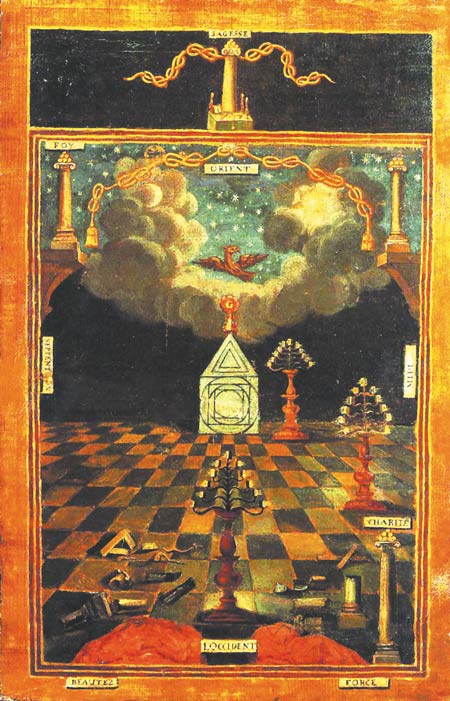 |
| An expression of Masonry's traditionalism: symbols that have not changed for centuries |
Let us examine these words closely: An organization called Masonry exists. The members of this organization have for centuries followed a number of laws whose origins are unknown. Moreover, they are quite determined that no one alter these laws. Not one of them comes forward to ask why they follow them!… And, for the sake of following these laws, they readily ignore the discoveries of science and their logical conclusions. Can it be that such a society is following the path of "reason" and "science"?
Another part of the article quoted above, states literally that a Mason must obey the laws without questioning:
In my opinion, a landmark is such an old part of Masonry that I have never been curious about their origins neither in the lodge nor in my activities as a freemason. I cannot help analyzing why I should feel this way but I feel that if the structure of Freemasonry is not altered it will last…..I live with it without exerting any special effort.118
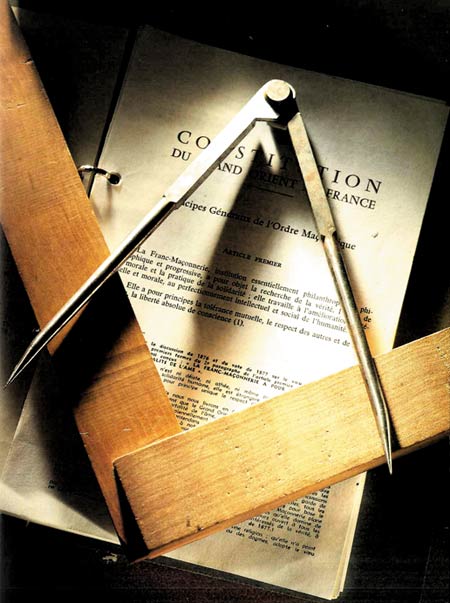 |
| The rules that have been accepted as Masonry's constitution have been preserved unchanged for centuries. |
How can an organization comprised of followers who believe and abide by laws about whose origins they are not curious be regarded as reasonable?…
Surely, Masonry's claim to be reasonable and scientific is completely hollow. Like other materialists, they too, despite the fact that they continually use the terms of reason and science, insistently defend a philosophy that has no logical or scientific support, and turn away from the facts that science has discovered. Essentially, what has led Masons into such error, or indeed spellbound them, is their blind attachment to their traditions.
This shows that the teaching of Masonry is deceptive. It alienated people from their belief in Allah, making them fall into superstition by following empty laws, myths and legends. What is revealed in the Qur'an about the pagans of Saba, who abandoned Allah to prostrate themselves before the Sun, is valid also for Masonry: "Satan has made their actions seem good to them and debarred them from the Way so they are not guided" (Surat an-Naml: 24)Masons reject the religion of Allah in favor of an outmoded doctrine that they elaborate upon with gilt symbols and mystical elements.
Moreover, not content with rejecting Allah, they fight against religious moral values, a struggle they have been engaged in a very long time.
94 Mason Dergisi (Journal of Freemasonry), No. 48-49, p. 67
95 Mason Dergisi (Journal of Freemasonry), No. 48-49, p. 67, (emphasis added)
96 Dr. Selami Isindag, Kurulusundan Bugune Masonluk ve Bizler (Freemasonry and Us: From Its Establishment Until Today), Masonluktan Esinlenmeler (Inspirations from Freemasonry), Istanbul 1977, pp. 274-275, (emphasis added)
97 Dr. Selami Isindag, Kurulusundan Bugune Masonluk ve Bizler (Freemasonry and Us: From Its Establishment Until Today), Masonluktan Esinlenmeler (Inspirations from Freemasonry), Istanbul 1977, pp. 274-275
98 Pocock, in; Edmund Burke, Reflections on the Revolution in France, ed. J. G. A. Pocock, Indianapolis: Hackett Publishing Company, 1987, pp. 33-38
99 Desmond King-Hele, Doctor of Revolution: The Life and Times of Erasmus Darwin, Faber & Faber, London, 1977, p. 361
100 Henry Morris, The Long War Against God, p. 178
101 William R. Denslow, 10,000 Famous Freemasons, vol. I. Macoy Publishing &Macoy Supply Co., Inc. Ricmond, Virginia, 1957, p. 285
102 William R. Denslow, 10,000 Famous Freemasons, vol. I. Macoy Publishing & Macoy Supply Co., Inc. Ricmond, Virginia, 1957, p. 285
103 Henry Morris, The Long War Against God, p. 198. Order of the Illuminati, which was founded in Bavaria, Germany in 1776 was a kind of a Masonic lodge. The founder of the Illuminati, Dr. Adam Weishaupt, was a Jew. He enumerated the goals of the Order as follows: 1- To abolish all monarchies and regular governments, 2- To abolish the personal property and inheritance, 3- To abolish the family life and the marriage institution and to establish a communal education system for children, 4- To abolish all religions. (see, Eustace Mullins, The World Order: Our Secret Rulers, p. 5; Lewis Spence, The Encyclopedia of the Occult, p. 223)
104 Henry Morris, The Long War Against God, Master Books, April 2000, p. 198
105 Pope Leo XIII, Humanum Genus, "Encyclical on Freemasonry," promulgated on April 20, 1984.(emphasis added)
106 Henry Morris, The Long War Against God, p. 60
107 For Huxley's Masonry, see (Albert G. Mackey. "Charles Darwin and Freemasonry." An Encyclopedia of Freemasonry, New York: The Masonic History Company, 1921, Vol. III.) Royal Society or with the full name The Royal Society of London for The Improvement of Natural Knowledge was founded in 1662. All the members of the society were all Masons without an exception. See, John J. Robinson, Born in Blood, p. 285
108 For the support Royal Society gave to Darwinism, see Henry Morris, The Long War Against God, pp. 156-57
109 Anton Pannekoek, Marxism And Darwinism, Translated by Nathan Weiser. Transcribed for the Internet by Jon Muller, Chicago, Charles H. Kerr & Company Co-operative Copyright, 1912 by Charles H. Kerr & Company, (emphasis added) (http://www.marxists.org/archive/pannek oe/works/1912-dar.htm)
110 Dr. Selami Isindag, "Bilginin Gelismesinde Engeller ve Masonluk" (Obstacles in the Development of Knowledge and Freemasonry), 1962 Annual Bulletin of the Turkish Grand Lodge of Free and Accepted Masons p. 44, (emphasis added)
111 Francis Darwin, Life and Letters of Charles Darwin, Vol.II, from charles Darwin to J. Do Hooker, March 29, 1963
112 Fred Hoyle, Chandra Wickramasinghe, Evolution from Space, p.130, (emphasis added)
113 Dr. Selami Isindag, Evrim Yolu (The Way of Evolution), Istanbul1979, p. 141, (emphasis added)
114 P. M. Giovanni, Turkiye Fikir ve Kultur Dernegi E. ve K. S. R. Sonuncu ve 33. Derecesi Turkiye Yuksek Surasi, 24. Conference (The Turkish Society of Idea and Culture, 33rd degree, Turkey Supreme Meeting, 24th conference), Istanbul, 1973, p. 107, (emphasis added
115 Dr. Selami Isindag, Sezerman Kardes VI, Masonluktan Esinlenmeler (Inspirations from Freemasonry), Istanbul 1977, p. 78, (emphasis added)
116 Dr. Selami Isindag, "Masonluk Ogretileri" (Masonic Doctrines), Masonluktan Esinlenmeler (Inspirations from Freemasonry), Istanbul 1977, p. 137 117 Tanju Koray, Mimar Sinan, 1992, No: 85, p. 46, (emphasis added) 118 Tanju Koray, Mimar Sinan, 1992, No: 85, p. 49, (emphasis added) 